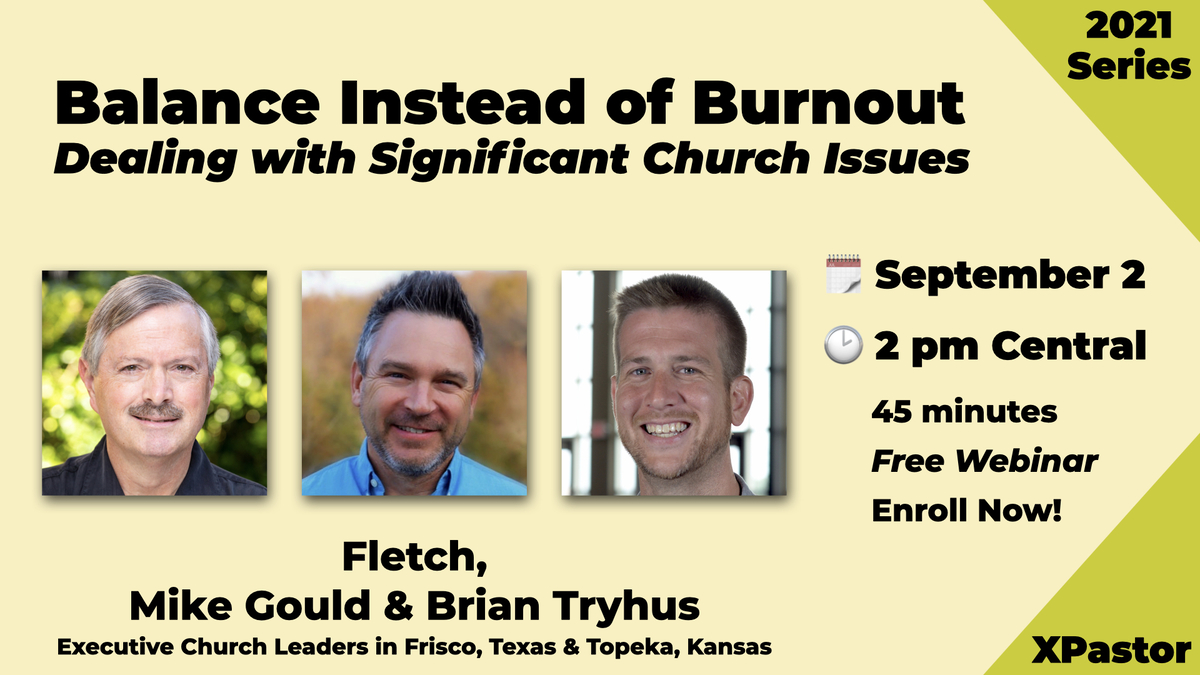“I talked about my sabbatical from the pulpit,” said Pastor Mark Brewer. “I even brought up the Elders at each of the three services, and brought up all of the pastoral staff. But, the congregation still had questions.”
- Mark, there’s an undercurrent that you are half way out the door.
- Mark, are you coming back?
- Mark, are you being disciplined by the Elders?
Mark commented, “In churchland, people cloak things in Christianese. The one lady came from a church where sabbatical was code for discipline.”
Sabbaticals can hide a secret code. It can be an easy way to get rid of staff or for a pastor to look for a new job. Is a sabbatical a siesta, a period to rest before returning to work? Or, is it for study, preparation for continuing ministry, enrichment of the mind and soul?
When the Rev. Dr. Mark Brewer, Pastor and Head of Staff at Bel Air Presbyterian Church of Los Angeles went on sabbatical in October of 2006, he faced all these questions.
About Mark and Bel Air Pres
Mark is a third-generation Presbyterian minister’s son. He received his early education in Denver, Colorado and did his doctoral work at Fuller Theological Seminary in Pasadena and in St. Andrews, Scotland.
He served as Pastor in the Denver area for twenty years, not only building up his own congregation but also reaching out to the larger Denver community. He was involved in starting two churches in Denver, each growing to several thousand members. Mark launched the nationally syndicated radio ministry “A New Day for America” which seeks to build relationships between the urban and suburban churches—also the subject of his book, A Walk Into The City.
Mark can be blunt and funny. Commenting on the Presbyterian Church (USA) position on the Middle East he said:
The General Assembly fell out of the stupid tree and hit every branch going down.
Commenting on those who try to redefine the core of the gospel, Mark said:
When referring to the Trinity, most Christians are likely to say, ‘Father, Son and the Holy Spirit.’ But leaders of the Presbyterian Church (USA) are suggesting some additional designations: ‘Compassionate Mother, Beloved Child and Life-giving Womb,’ or perhaps ‘Overflowing Font, Living Water, Flowing River. You might as well put in Huey, Dewey and Louie.’
About a possible split in the Presbyterian Church (USA):
Right now there’s this awkward pause. Everybody’s got their hand by their holster, but nobody’s drawing yet. And the denomination’s waiting now, looking around the room, going ‘Who’s going to make the first move?’
Bel Air Pres is one of the most influential churches in the Los Angeles area, with seven ordained pastors and over sixty program staff. It has an annual budget of $6.8 million. Many members are often affluent and influential in Los Angeles and the entertainment industry. Bel Air is the former church of President and Mrs. Ronald Reagan. Wikipedia notes that Jessica Simpson, Nick Lachey, and Leonardo DiCaprio are among the celebrities that attend. The church has almost 3,000 members, making it one of the largest Presbyterian churches in the country.
Here’s the $40,000 conclusion to my sabbatical—ruin a church by having the government help it and ruin a city by having the church run it.”
Six-Month Sabbatical
When Mark was negotiating the terms of call to come to Bel Air, he included a sabbatical. “This was my second sabbatical, the first was twenty years ago. It was a totally different story as I mostly studied at St. Andrews in Scotland. Most don’t take sabbaticals because they fear it may roll on them.” By this he means that adverse effects will happen in the pastor’s absence. “The congregation suffers if you don’t take it because a good sabbatical models health to the congregation about life’s fears and work.”
Mark left on sabbatical in October 2006, made a mid-sabbatical visit in January for three weeks. There was tragedy in the middle of the Sabbatical as a family member died very suddenly of cancer. During those three weeks, he came home and “did some counseling and church dinners every night—which I wouldn’t recommend.” Also, he preached once and met with new Elders.
During the sabbatical he studied at Oxford and other cities. “Study was my main focus. I worked on a book on spiritual intelligence, a quadrilateral based on Scripture, reason, wise counsel and prayer. I studied Augustine, Aquinas and Luther on church-state issues. Here’s the $40,000 conclusion to my sabbatical—ruin a church by having the government help it and ruin a city by having the church run it.”
“We want to transform Los Angeles, to bring the political, moral and spiritual institutions together.” For Los Angeles, the conclusion from Mark’s sabbatical was that “I am such an evangelical in the Presbyterian Church USA and we fight the wrong hills in social transformation. We need to just work together. We need more small groups with others, such as the dominant Korean and African-American churches. We need worship field trips—shut down worship and go somewhere else for a Sunday!”
“I am more excited to be here now because of the mission—and that was a surprise from the sabbatical. Pastors need to go away to get away and being away I could contextualize the mission of Bel Air. That’s why I studied in Australia and Europe. Australia has some of the lowest church attendance of 3-4% of the population and Europe is 4-5%.” Mark gained perspective on Los Angeles and culture in the United States by being able to reflect on it from a distance.
“In coming back, I also re-contextualized the staff. I saw the people to retain. And, I became more resolved in the others who need to transition. I had ‘away eyes’ when I came back. It was the luxury of being objective when I came back. I could say, ‘now I see.’ In coming back, you look at your team very differently. The good and the bad were intensified.”
Mark stayed in touch with the church in a variety of ways. “I did an email epistle to the staff every third week to let them know what I was doing. I talked on the phone probably only three times to the Executive Pastor.” A mistake for Mark was keeping the same cell phone number. “Some people called me every third or fourth day. The people that I had in pastoral counseling called me and I should have gotten a different cell number. Some elders contacted me. But no one was tattling on the staff. There were no end runs while I was gone.”
I had “away eyes” when I came back. It was the luxury of being objective when I came back. I could say, “now I see.” In coming back, you look at your team very differently. The good and the bad were intensified.
Empowerment & Delegating
As a symbol of empowerment, Mark told several people “I hope that you are here when I get back.” The clear implication was that it was possible for staff to be terminated while he was away. “This was a great opportunity to test leadership, to not steer the plane into the hill. It helped clarify the roles too, differentiate from Mike’s and Roger’s roles. I trust Roger (Executive Pastor) and had a great Executive Administrator in Mike.” When asked what he delegated, Mark replied “Everything! Jim Colins in Built to Last said that one of the big determents of an ongoing organization is a strong voice at the top that doesn’t delegate. I felt loved by the church and it has doubled since I have been here, but this is Christ’s church. This is a huge relief to a Senior Pastor. It is the Lord’s church. So go!”
Mark put Roger in charge of the pulpit; Roger spoke on five Sundays. They had twelve Sundays from outside speakers. Two other pastors spoke for a total of four Sundays. “The only feedback that we got was that there wasn’t enough color or women speaking,” Mark noted.
While in the role of the lead pastor, Roger and his wife, Megan, attended many church and social functions. “We were surprised at the parties at Christmas. Since Mark was gone, we went to them. This church is out of control in its ability to party. It is so LA. Mark will have many a night of two parties.” As Mark is an extrovert and loves the social events, Roger found it tiring.
“At first there was a bizarre rumor that Roger and I were at odds with each other,” Mark said. “The rumor was that we both were leaving after a huge fight. Yet, I wouldn’t have done it without Roger and Mike—I trusted the team back home.” With laughter, Mark shared that “the budget went up and attendance went up while I was gone. If I went away for another six months, we would make a fortune. Attendance surged just a little when I came back.”
Sabbatical at Bel Air is only offered to ordained pastors, either for six-months at full pay or twelve-months at half pay. A year is a long time to be away from the church and ministry! In the case of a Bel Air Pastor who took a year sabbatical, elements of her position changed while she was gone. At the beginning of the sabbatical, she and Roger were peers and at the end, Roger was her supervisor.
Conclusion
Sabbatical can be a time for study and rest. It doesn’t have to be time to say goodbye to a pastor. However, as seen at Bel Air, both a good policy and a healthy view on sabbatical are necessary. There will be some in the congregation who will see the sabbatical as Christian slang for a termination or an act of discipline.
Mark Brewer’s sabbatical illustrates how a positive sabbatical can reinvigorate and reinvest in a pastor, allowing for continued ministry—even stronger and more focused ministry than before.
Also published in Church Executive magazine, July 2008.











